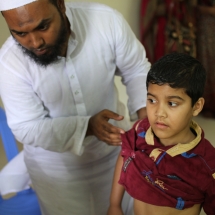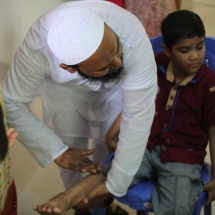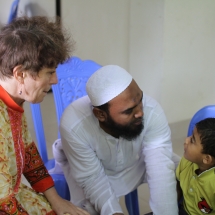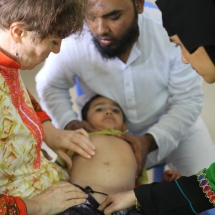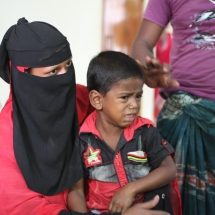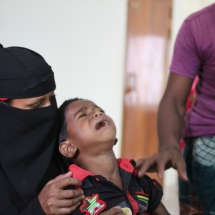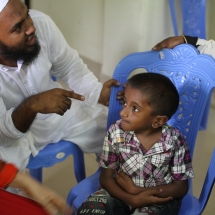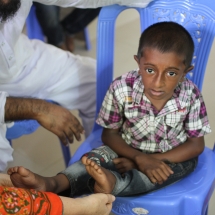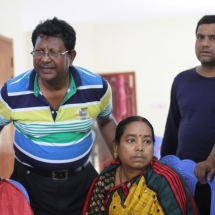Sunday 20/3/16 – Day 5
A day off! In Australia, a day off can mean having a sleep in, doing household chores we don’t get to do through the week, watching a favourite TV show or movie or perhaps catching up with friends. Here, sleeping till lunchtime was our main priority. Our bodies were so exhausted. I still had pain in the lower back (it’s extended further down), Colleen’s tummy was still upset and she was only eating minimally to stop the churning in her gut. Micheal’s good. He obviously comes from sturdier stock…lol.
Around lunchtime, breakfast arrived, but Colleen and I could eat only a little bit. Micheal ate lots. Colleen and Yasin (one of our helpers at the clinic) massaged my back and put a hot pack on it. It felt much better. The family downstairs came and went freely, and they were very loud. Beautiful people and so hospitable. We love them dearly.
We got ready to go out for a tour of Narsgindi, first by boat, then by tuk-tuk. We were told the river was very polluted and not safe to put our hands or feet in. Yet, we observed women and children bathing in it and washing clothes in it. As we toured around, we were followed everywhere. People want to bring their sick children to us to heal them. They think we are some sort of magical healers that can touch their children and heal them instantly. The crowds got bigger each time we stoped to take photos. We stopped for photos at government buildings and sculptures. Taohida Sarkar Runa is one of the government officials of Narsgindi. She proudly showed us her province and told us that the people are very poor. She is also the chairperson of the Narshgindi Women’s Sports teams, cricket, soccer and badminton. A very busy woman.
We received a gift of traditional clothes from Preeanca and Linda, and our now we are officially Bengali women.
Monday 21/3/16 – Day 5
The morning was smoggy, with a grittiness in the air. The pollution was stopping the sun from shining through. We started the day with the usual array of similar cases as the previous days. Yet, among these broken bodies were some gems.
There were two children from the same family with severe brain damage. Siam and Jalal, both 8 years old, had the same challenges walking. I did Bowen moves on their Psoas muscles and they could walk much better. Massaging their legs with magnesium oil will continue to improve their ability to walk.
Tamjim, 8 years old, had a serious lack of mental and physical development and there was very little we could do for him. Rifat, an 11 year old boy, was inspiring to us all. Born with a short, deformed body, very short legs, one longer than the other. He had broken the shorter leg many times by trying to walk. He was amazingly intelligent, able to speak both Bangla and English clearly. He could move his arms normally and write. I told him he could do anything he wanted to in his life, and showed him a video of Nick Vujuvic, an inspirational speaker born without arms and legs. He seemed to get emotional about someone believing in him. All his mother wanted, was for him to grow legs and walk. That was never going to happen, but he could become famous and awesome in anything he did. He was that incredible!
The next patient was a 15 year old girl, Panna, who was severely brain-damaged. She looked healthy enough and could walk and move her arms. “What was the parents concern?”, I asked. “She’s 15 years old and at an age where she is ready to marry, we want her well.” I said, “You’re kidding!!” to the Dr. He laughed and understood the absurdity of the situation. We explained to the parents that she could not marry as she was too brain-damaged to function. “But she has started menstruating, she is ready to marry,” they continued to protest. They could not understand that their daughter was not mentally, physically or emotionally capable enough to be a wife in any form. The Dr did his best to explain this to them. In Bangladesh, when a young woman is of marriageable age, the family arranges for her to be married, where she will go and live with her husbands family. The eldest son, often lives at home to look after the parents. There is no pension system in Bangladesh, so the children take care of the parents. It is hard for a parent to accept their child is unable to care for themselves and that they will be dependent on them for the rest of their lives.

